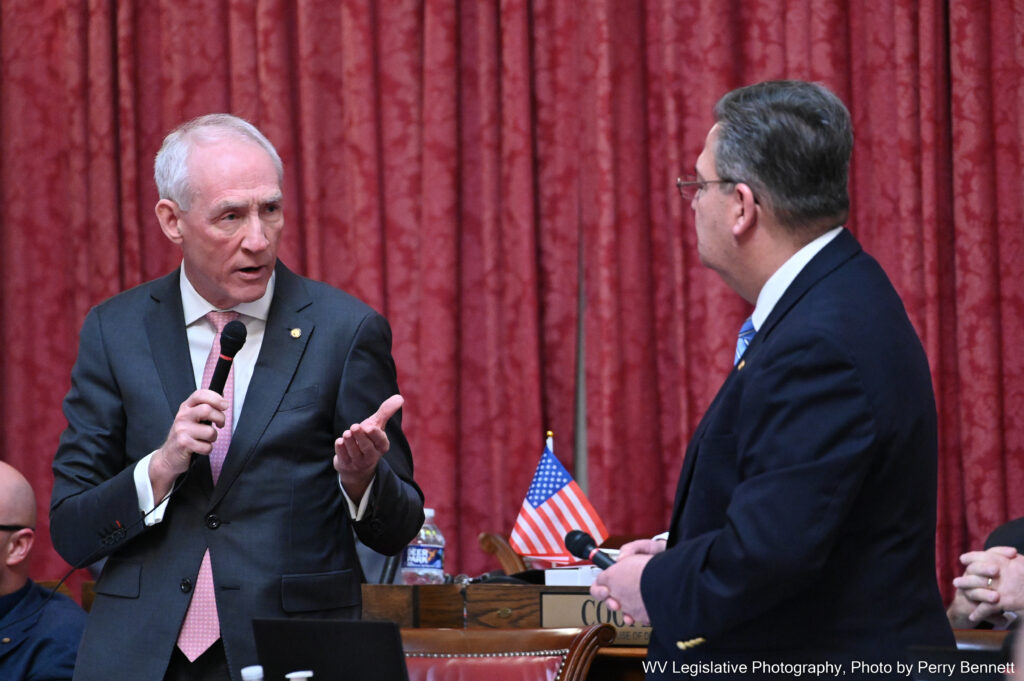Updated on Saturday, March 4, 2023 at 3 p.m.
After more than three hours of passionate debate riddled with number crunching and tales of the haves and have nots, Senate Bill 268, meant to shore up the state’s Public Employees Insurance Agency (PEIA) passed with a 69 to 27 vote and four members absent.
The bill presenter, Del. Matthew Rohrbach, R-Cabell, spoke of a ballooning PEIA deficit that now stands at $154 million and will loom to more than $422 million by 2027 without reform.
The proposal raises the insured member premiums 24.7 percent, keeps the health insurance payment at an 80 to 20 split, charges an additional $147 per month to maintain a spouse in PEIA coverage and raises medicare reimbursement rates to West Virginia hospitals to 110 percent.
Rohrbach talked of primary care providers denying PEIA policy holders medical treatment, saying this is the first significant premium hike in a dozen years, and a combination of a proposed $2,300 state employee pay raise coupled with tax cuts would help offset the premium increase.
“Failure to act is not an option for a couple of reasons, one of which I just gave you about the dire financial straits that we’re headed towards,” Rohrbach said. “We’re heading into worker’s comp 2.0, where the program is about to collapse.”
Del. Larry Rowe, D-Kanawha, said his calculations showed it would cost a PEIA policyholder who wanted to keep a spouse covered $2,400 a year, negating any pay raise increase.
Bill amendments adopted include keeping an 80/20 payment to those using out-of-state health providers working in contiguous border counties, folding in Senate Bill 577, limiting insulin co-pays to $35 and preventing the state from adding immunizations to be required, stating that state code would need to be revised.
Amendments that failed included waiting until fiscal year 2025 to implement premium increases and limiting premium hikes to 10 percent a year.
Votes against the bill from Republicans like Del. Todd Kirby, R-Raleigh, came with outrage that the state would use $500 million to boost economic development instead of helping its 230,000 workers maintain their health insurance.
“When you hear the proponents of this bill talking about investment, what they’re really talking about are deals in which our government, excuse me, our taxpayers dollars, are given not as loans, not as tax incentives, but are just given to international corporations,” Kirby said. “Given to some of the richest people in the world with zero guarantee that our people will ever get any return on our tax dollars.”
Del. Joey Garcia, D-Marion, said his no vote came with seeing previous PEIA fixes come without a more than a $1 billion current state surplus.
“There was a bill that passed that created the PEIA stabilization fund and it is a pretty interesting concept,” Garcia said. “It would allow the legislature to put money into that fund but it also allowed for the Secretary of Revenue to try to take from certain special revenue sources every quarter. I find it interesting, when we didn’t have the money, we found a way. Now that we have the money we are looking for a way out of doing what is right for our public employees.”
Rohrbach closed debate on the bill by reiterating that Senate Bill 268 was the best way at this time to prevent PEIA from going under.
“If we keep the failing system of frozen premiums and direct general transfer funds that we currently have, it’s also going to risk collapsing provider availability and it ultimately risks the solvency of PEIA is the place that we’re headed right now,” Rohrbach said. “If this was a private health insurance plan, the state insurance commissioner would have us under a severe watch list heading towards insolvency. Therefore, the conclusions were reached that this plan has to be stabilized.”
The bill was voted effective from passage. It now goes back to the Senate to consider the amendments from the House.
**Editor’s note: A previous version of this story said the fee was $147. We have clarified to reflect that the fee is monthly.




















